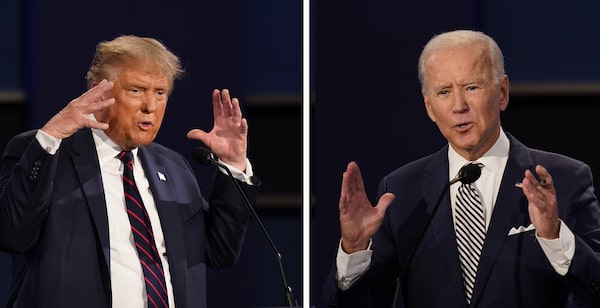
This combination of photos show President Donald Trump, left, and former Vice President Joe Biden during the first presidential debate on Sept. 29, 2020, in Cleveland, Ohio.Patrick Semansky/The Associated Press
Here’s one way the American presidential election looks in mid-April: One of the candidates spent time holed up in a New York courtroom consulting with lawyers. The other hunkered down in the White House consulting with Israeli Prime Minister Benjamin Netanyahu.
Here’s another: The contest is a collision between one contender’s effort to exploit his role as a martyr for the dispossessed in what he calls a justice-system “scam” and the other’s attempt to reap benefit from his role as leader of a superpower in a convulsive world.
And a third: The bottom line in this campaign is whether a race to the bottom by two figures with big negatives is shaped more by the risk one of them faces in being found guilty in multiple court cases or by the risk the other takes in displaying his frailty in multiple campaign appearances.
Now a sobering reminder. There remain almost seven months to go in a campaign that this month can be distilled to two parallel contests: One bears the official name People of the State of New York v. Donald J. Trump. The other is simply Joe Biden versus Donald Trump.
Other modern campaigns have been waged over whether Japanese auto imports were endangering American economic independence (1988); whether the country’s economy was in the doldrums or on the rebound (1992); how to deal with violent crime (1996); how to use projected budget surpluses (2000); how to deal with terrorism (2004); how to reshape the health care system (2008); whether income inequality is a threat to democratic values (2012); and the best way to address immigration (2016).
This one is about some of those issues – crime, the economy, the wealth gap, immigration – plus whether Mr. Trump’s prior sex life is an admissible element of the first criminal trial of a former American president, a case centred on allegations of hush-money payments to a porn star; whether he might be excused from the courtroom to attend his son’s high school graduation from the Oxbridge Academy in Palm Beach, Fla.; and, arguably far more critically, whether a president has immunity from legal prosecution – a question that the U.S. Supreme Court will examine next week in a session that New York Supreme Court Judge Juan Merchan ruled that Mr. Trump could not attend.
But as a tortuous jury selection in process in the Stormy Daniels case continued Tuesday, the U.S. Supreme Court heard separate oral arguments on whether arcane elements of two-decade-old accounting-fraud legislation, crafted to respond to the collapse of the Enron energy behemoth, can be applied to the trial of election deniers who rioted at the Capitol on Jan. 6, 2021, and, by extension, to Mr. Trump himself.
“This campaign is unprecedented in just about every sense of the word,” said Charles Hunt, a political scientist at Idaho’s Boise State University. “You have a former president seeking another term caught up in a courtroom for a quarter of the remaining days of the campaign. You have a sitting president battling being considered too old to be president, even though the other candidate is old, too. And you have the question of whether in a calcified, paralyzed political environment, there’s really any benefit in an additional campaign stop in, say, Pennsylvania.”
Mr. Biden apparently believes there is. While Mr. Trump was on the 15th floor of the Manhattan criminal court, Mr. Biden was spending three precious campaign days in Pennsylvania, the eighth time he has visited his native state this year. His return Tuesday to Scranton, the central Pennsylvania town where he was reared, was an acknowledgment that voters in communities where the Democrats once had a solid advantage comprise some of the critical battlegrounds of the 2024 election. A massive Pew Research Center study released in the past week showed that 57 per cent of middle-income voters without a college degree now associate with the Republicans.
Pennsylvania also is a fertile testing ground for courting those who voted for Mr. Biden in 2020 but who say they will cast their ballots for Mr. Trump in 2024. Slightly more than half of them identify as moderates, according to a study by Blueprint, a Democratic-oriented public-opinion research group that examines swing voting groups and argues that “the central vulnerability that Democrats face in 2024 is not the quality of our current governance or policies, but rather our inability to create a compelling narrative that can sway voters in the most fiercely contested states.”
The challenge for them, as for Mr. Trump, is breaking through the calcification that Prof. Hunt, the Boise State scholar, considers the defining feature of the electorate. The most recent Wall Street Journal poll of voters in the top battleground states underlines that characteristic. Mr. Biden won the support of 88 per cent of Democrats while Mr. Trump won 90 per cent of Republicans. Calcified R Us.